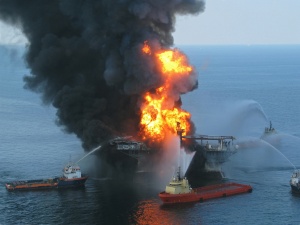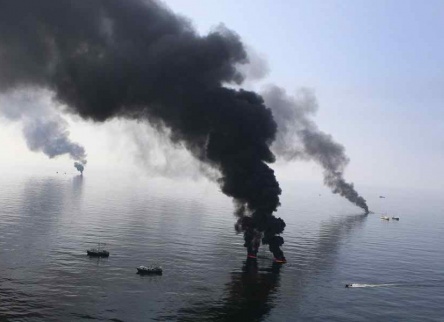Difference between revisions of "Deepwater Horizon"
(desc) |
(add on, unstub) |
||
| Line 1: | Line 1: | ||
{{event | {{event | ||
|image=Deepwater Horizon.jpg | |image=Deepwater Horizon.jpg | ||
| − | |constitutes= | + | |constitutes=Ecocide, Superfund site, White-collar crime |
|description=An ecologically disastrous oil spill | |description=An ecologically disastrous oil spill | ||
|wikipedia=https://en.wikipedia.org/wiki/Deepwater_Horizon_explosion | |wikipedia=https://en.wikipedia.org/wiki/Deepwater_Horizon_explosion | ||
|latitude=28°44′12.01″N | |latitude=28°44′12.01″N | ||
|longitude=88°23′13.78″W | |longitude=88°23′13.78″W | ||
| − | |locations=Gulf of Mexico, Louisiana, United States | + | |locations=Gulf of Mexico, Mexico, Louisiana, United States |
| − | |start= | + | |start=20 April 2010 |
| − | |end= | + | |end= |
| + | |fatalities =11 | ||
| + | |injuries=17 | ||
}} | }} | ||
| + | The '''Deepwater Horizon''' drilling rig explosion and subsequent fire on the ''Deepwater Horizon'' offshore drilling unit, which was owned and operated by [[Transocean]] and drilling for [[BP]] in the Macondo Prospect oil field (about 40 miles/64 km southeast off the [[Louisiana]] coast). The explosion and subsequent fire resulted in the sinking of the platform. The same blowout that caused the explosion also caused an oil well fire and a massive offshore oil spill in the [[Gulf of Mexico]] which is considered the largest marine oil spill in the world, and the largest [[environmental disaster]] in U.S. history. | ||
[[image:Deepwater Horizon controlled burn.jpg|left|thumbnail|444px|A 2010 'controlled burn' of oil off the Louisiana coast.]] | [[image:Deepwater Horizon controlled burn.jpg|left|thumbnail|444px|A 2010 'controlled burn' of oil off the Louisiana coast.]] | ||
| + | |||
| + | ==Background== | ||
| + | The disaster exposed a major failure of the federal agency empowered to regulate the oil drilling industry (Minerals Management Service). Regulators and employees of the companies they were meant to control repeatedly engaged in parties and interpersonal relationships with each other, often resulting in a lack of actual regulation. Employees of the regulatory agency often moved through a [[revolving door]], at times working for the agency while at other times working for the oil companies. In the end, Secretary of the Interior, [[Ken Salazar]], issued a secretarial order to break up MMS into several regulatory agencies with very narrowly defined roles and duties.<ref>https://haenfler.sites.grinnell.edu/elite-deviance-and-white-collar-crime/ saved at [https://web.archive.org/web/20211121201150/https://haenfler.sites.grinnell.edu/elite-deviance-and-white-collar-crime/ Archive.org] saved at [https://archive.is/ysmgM Archive.is]</ref> | ||
| + | |||
| + | ==Impact== | ||
| + | [[File:Deepwater Horizon-Shrimp.jpg|400px|right|thumb|Deformed shrimp with black tissue were common at the time.<ref>https://web.archive.org/web/20190818051001/https://gizmodo.com/bp-oil-spill-aftermath-eyeless-shrimp-clawless-crabs-5903021</ref><ref>https://web.archive.org/web/20190818051001/http://www.aljazeera.com/indepth/features/2012/04/201241682318260912.html</ref><ref>[[Al Jazeera]] - [https://www.youtube.com/watch?v=_VVyPiV5xdY Gulf seafood deformities alarm scientists],8 April 18, 2012 | ||
| + | </ref>]] | ||
| + | The oil spill impacted the marine life heavily in an area (and still does)<ref>https://www.atlasobscura.com/articles/deepwater-horizon-oil-spill-aftermath saved at [https://web.archive.org/web/20210225003406/https://www.atlasobscura.com/articles/deepwater-horizon-oil-spill-aftermath Archive.org] saved at [https://archive.fo/0uhY3 Archive.is]</ref> which is reliant on fishery, in the US,<ref>https://captaindont.blogspot.com/2012/05/deformed-gulf-seafood-is-part-of.html saved at [https://web.archive.org/web/20181009085533/https://captaindont.blogspot.com/2012/05/deformed-gulf-seafood-is-part-of.html Archive.org] saved at [https://archive.is/e0Bhk Archive.is]</ref> as well as in [[Mexico]].<ref>https://www.theguardian.com/us-news/2020/apr/19/deepwater-horizon-mexico-10-years-on</ref> | ||
| + | |||
| + | [[CNN]] reporting in [[2019]] had an article with the headline: "Crabs and shrimp are flocking to the Deepwater Horizon spill site to mate, and it's making them sick",<ref>https://edition.cnn.com/2019/09/10/us/crabs-deepwater-horizon-study-scn-trnd/index.html</ref> that behavior is possibly due to them confusing a toxin released by the oil (or other chemicals used) with a hormone that attracts mates.<ref>https://storymaps.arcgis.com/stories/c30654bf21b74d269a3911ca18444b96 saved at [https://web.archive.org/web/20220115212738/https://storymaps.arcgis.com/stories/c30654bf21b74d269a3911ca18444b96 Archive.org] saved at [https://archive.fo/YifC8 Archive.is]</ref> | ||
| + | |||
| + | {{CCM}} reporting in [[2010]] was mostly clueless when it came to point out the obvious health hazards.<ref>https://www.sfgate.com/news/article/Louisiana-shrimping-season-reopens-after-spill-3178215.php saved at [https://web.archive.org/web/20220115214237/https://www.sfgate.com/news/article/Louisiana-shrimping-season-reopens-after-spill-3178215.php Archive.org] saved at [https://archive.fo/gqWdO Archive.is]</ref> Some questioned official findings.<ref>https://web.archive.org/web/20201023215034/https://www.huffpost.com/entry/gulf-seafood-safety-bp-spill_n_1007027</ref> US government agencies declared the seafood from the disaster zone safe in [[2015]].<ref>https://www.ncbi.nlm.nih.gov/pmc/articles/PMC4314241/</ref><ref>https://ehp.niehs.nih.gov/doi/full/10.1289/ehp.123-A45</ref> | ||
==Lawsuit== | ==Lawsuit== | ||
| − | In July 2015 BP reached an $18.7bn settlement with the US government, the states of Alabama, Florida, Louisiana, Mississippi and Texas, as well as 400 local authorities. | + | In July [[2015]] BP reached an $18.7bn settlement with the US government, the states of Alabama, Florida, Louisiana, Mississippi and Texas, as well as 400 local authorities. |
BP’s cost for the clean-up, environmental and economic damages and penalties has exceeded $54bn. | BP’s cost for the clean-up, environmental and economic damages and penalties has exceeded $54bn. | ||
| Line 19: | Line 34: | ||
==References== | ==References== | ||
{{reflist}} | {{reflist}} | ||
| − | |||
Revision as of 22:00, 15 January 2022
 | |
| Date | 20 April 2010 - Present |
|---|---|
| Location | Gulf of Mexico, Mexico, Louisiana, United States |
| Deaths | 11 |
| Injured (non-fatal) | 17 |
| Interest of | Brian Gilvary |
| Description | An ecologically disastrous oil spill |
The Deepwater Horizon drilling rig explosion and subsequent fire on the Deepwater Horizon offshore drilling unit, which was owned and operated by Transocean and drilling for BP in the Macondo Prospect oil field (about 40 miles/64 km southeast off the Louisiana coast). The explosion and subsequent fire resulted in the sinking of the platform. The same blowout that caused the explosion also caused an oil well fire and a massive offshore oil spill in the Gulf of Mexico which is considered the largest marine oil spill in the world, and the largest environmental disaster in U.S. history.
Contents
Background
The disaster exposed a major failure of the federal agency empowered to regulate the oil drilling industry (Minerals Management Service). Regulators and employees of the companies they were meant to control repeatedly engaged in parties and interpersonal relationships with each other, often resulting in a lack of actual regulation. Employees of the regulatory agency often moved through a revolving door, at times working for the agency while at other times working for the oil companies. In the end, Secretary of the Interior, Ken Salazar, issued a secretarial order to break up MMS into several regulatory agencies with very narrowly defined roles and duties.[1]
Impact
The oil spill impacted the marine life heavily in an area (and still does)[5] which is reliant on fishery, in the US,[6] as well as in Mexico.[7]
CNN reporting in 2019 had an article with the headline: "Crabs and shrimp are flocking to the Deepwater Horizon spill site to mate, and it's making them sick",[8] that behavior is possibly due to them confusing a toxin released by the oil (or other chemicals used) with a hormone that attracts mates.[9]
Commercially-controlled media reporting in 2010 was mostly clueless when it came to point out the obvious health hazards.[10] Some questioned official findings.[11] US government agencies declared the seafood from the disaster zone safe in 2015.[12][13]
Lawsuit
In July 2015 BP reached an $18.7bn settlement with the US government, the states of Alabama, Florida, Louisiana, Mississippi and Texas, as well as 400 local authorities.
BP’s cost for the clean-up, environmental and economic damages and penalties has exceeded $54bn.
References
- ↑ https://haenfler.sites.grinnell.edu/elite-deviance-and-white-collar-crime/ saved at Archive.org saved at Archive.is
- ↑ https://web.archive.org/web/20190818051001/https://gizmodo.com/bp-oil-spill-aftermath-eyeless-shrimp-clawless-crabs-5903021
- ↑ https://web.archive.org/web/20190818051001/http://www.aljazeera.com/indepth/features/2012/04/201241682318260912.html
- ↑ Al Jazeera - Gulf seafood deformities alarm scientists,8 April 18, 2012
- ↑ https://www.atlasobscura.com/articles/deepwater-horizon-oil-spill-aftermath saved at Archive.org saved at Archive.is
- ↑ https://captaindont.blogspot.com/2012/05/deformed-gulf-seafood-is-part-of.html saved at Archive.org saved at Archive.is
- ↑ https://www.theguardian.com/us-news/2020/apr/19/deepwater-horizon-mexico-10-years-on
- ↑ https://edition.cnn.com/2019/09/10/us/crabs-deepwater-horizon-study-scn-trnd/index.html
- ↑ https://storymaps.arcgis.com/stories/c30654bf21b74d269a3911ca18444b96 saved at Archive.org saved at Archive.is
- ↑ https://www.sfgate.com/news/article/Louisiana-shrimping-season-reopens-after-spill-3178215.php saved at Archive.org saved at Archive.is
- ↑ https://web.archive.org/web/20201023215034/https://www.huffpost.com/entry/gulf-seafood-safety-bp-spill_n_1007027
- ↑ https://www.ncbi.nlm.nih.gov/pmc/articles/PMC4314241/
- ↑ https://ehp.niehs.nih.gov/doi/full/10.1289/ehp.123-A45

